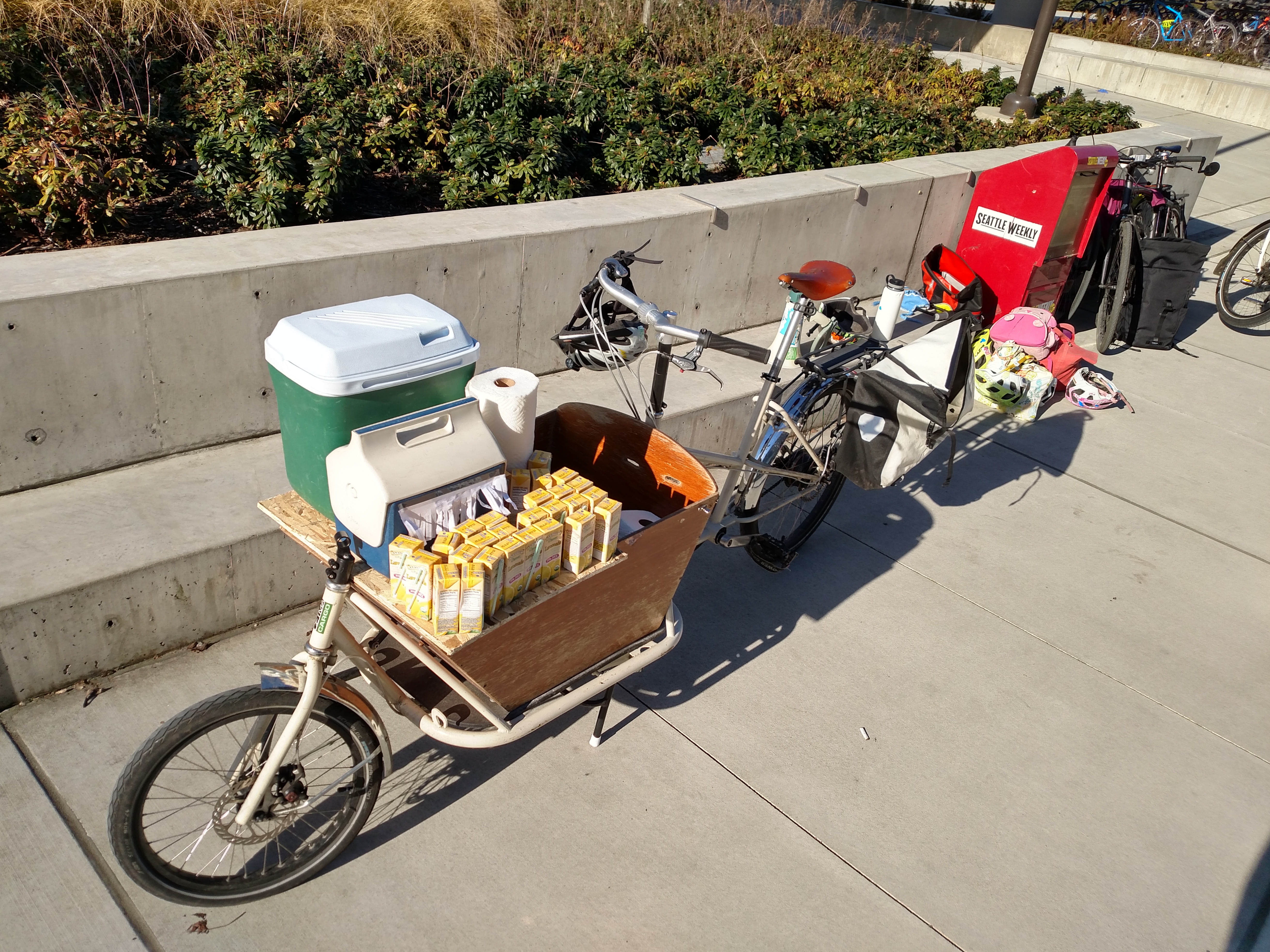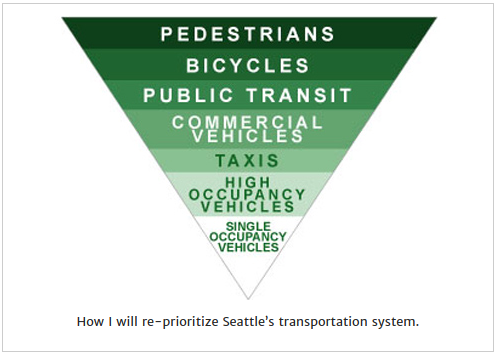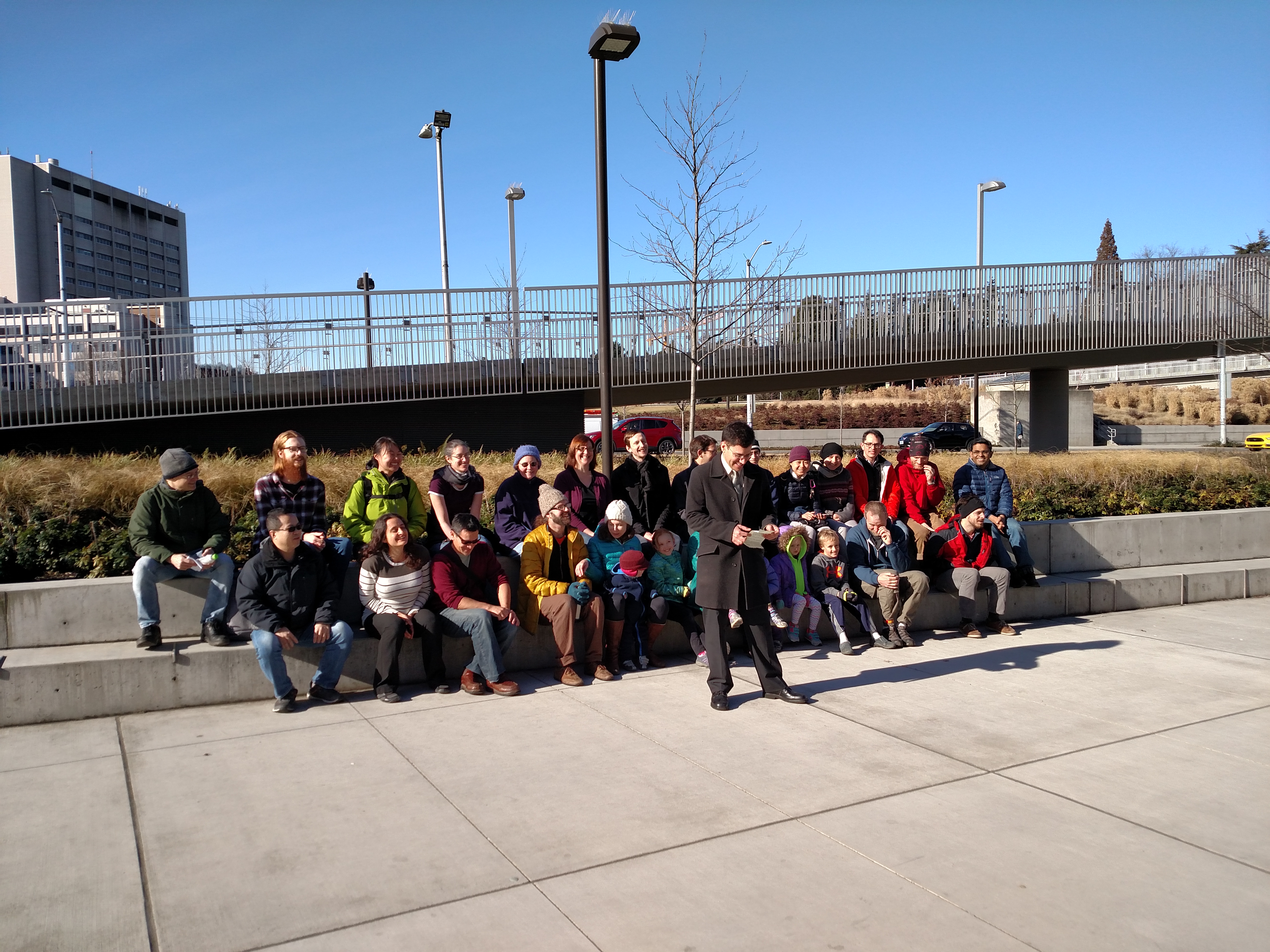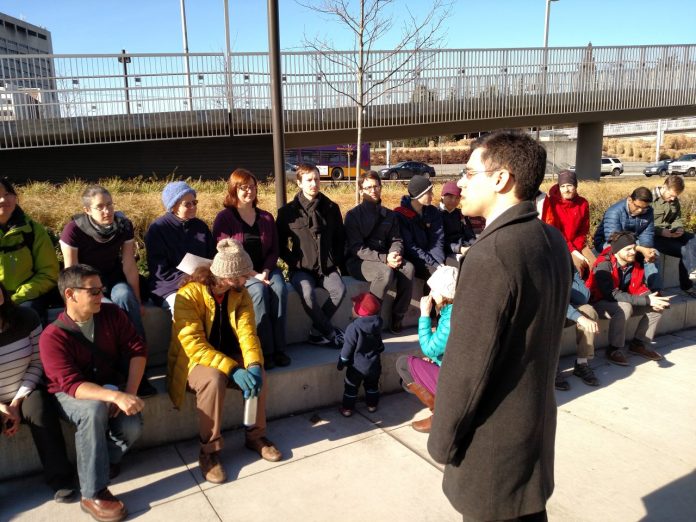At high noon today Roosevelt-based safe streets advocate Andres Salomon announced he’s running for mayor, becoming the first credible person to challenge incumbent Mayor Ed Murray.
Salomon’s campaign has identified four main issues: transportation, housing, policing, and technology-particularly municipal broadband. On transportation, his campaign will make road safety and Vision Zero a major issue: “I’m running for Mayor to make safe streets a priority for our city.”
“[Mayor Murray] has been very weak on walking and biking issues,” Salomon said. “We continue to have people dying in the streets, and his staff doesn’t even bother to show up to memorial walks.”
Salomon has been active in the urbanist community. He founded NE Seattle Greenways, has contributed on the Seattle Bike Blog and published a few articles here at The Urbanist. Salomon has been a vocal leader in the #Fix65th campaign to improve the street design on NE 65th St. The City recently announced it would begin the process of planning a safer NE 65th in 2017; although, it’s unclear if the city will implement the four to three lane conversion that Seattle Neighborhood Greenways favors or go the course of more superficial improvements.
The conventional wisdom is that defeating Mayor Murray will be very difficult because of his fundraising advantage. Murray significantly outraised Mike McGinn when he unseated him in 2013. Salomon is starting the race relatively late and will almost certainly lag far behind in campaign cash.
Nonetheless, some openings still exist for Salomon to exploit.
A Multimodal Mayor In The Making?
In Murray’s 2013 campaign, The Stranger asked Is Ed Murray Running To Be The Anti-Bike-Lane Mayor? The headline may have been sensational but Murray has certainly caused consternation in the bicycling community as he has slow-walked many projects and planning efforts, including the Bike Master Plan itself. The biggest bicycle infrastructure achievement during Murray’s tenure–the Westlake Cycletrack–was planned under previous mayor Mike McGinn, who was much more vocally pro-bike, sometimes to his perceived detriment.


To jumpstart safe biking infrastructure, Salomon has pledged to support the Basic Bike Network that Cascade Bicycle Club and Seattle Neighborhood Greenways have suggested as a stopgap for pressing safety needs Downtown. Completing the Basic Bike Network within four years would be very doable, Salomon said, and he also wants to improve the network across the city, not just Downtown. Salomon suggested a re-prioritization of street space is needed. “We need to focus on moving people, and not cars.”
“Just focusing on biking doesn’t work; we have the example of a bike lane being built on Dearborn [Street] where there’s no sidewalk next to it,” Salomon said. “What’s going to happen is that people are just going to walk on the bike lanes. We really need to focus on all modes and realize it’s not just one versus the other but that everybody is trying to get somewhere.”
Welcoming Housing Policies
Salomon said he wants to live in a safe, welcoming city and suggested declaring Seattle a sanctuary city like Mayor Murray has done must be backed up with policies to ensure newcomers can afford to live here. Salomon’s background–he immigrated from Ecuador at age three and his wife came as a refugee from the former Soviet Union when she was five–make him a compelling spokesperson for city seeking to reaffirm its multi-cultural identity in opposition to Trumpism, he argued.
To moderate the cost of housing, Salomon wants to get rid of parking minimums and relax zoning restrictions to stimulate housing production, particularly “missing middle” housing like rowhouses, stacked flats, small apartment buildings, and backyard cottages.

Municipal Broadband
Salomon voiced support for implementing municipal internet: “We Seattleites deserve to have Internet access and governance that is on-par with the tech city that we claim to be,” Salomon wrote. “Let’s build municipal internet.”
In contrast, Mayor Murray opposed municipal broadband in favor of that neoliberal unicorn of a private-public partnership. Municipal broadband would be too expensive, Murray argued. “The study that Murray mentioned determined that Seattle could construct a high speed network using a combination of property taxes and user fees for $440 million.” Ansel Herz reported last May. “The mayor—who received big donations from Comcast and CenturyLink during his last campaign—simply lacks the political will to advocate for building such a network at this time.”
Policing The Police
On policing, Salomon has vowed to scrap plans to build the $149 million North Precinct building and to work with King County to shrink the size of its planned youth jail in the Central District. Salomon has promised to implement stronger police accountability measures: “As Mayor, I will expediently implement promising new legislation on the issue of citizen oversight.”
Ironically, as Salomon announced his campaign with police reform as a pillar, most of the City Hall press corps was not at his announcement but at Mayor Murray’s simultaneous press conference Downtown regarding a police accountability bill, which the Mayor said would restore trust in the police, apparently.
Mayor sends legislation to City Council "To restore trust btwn police & members of Seattle's minority communities" https://t.co/Ywv5GiVpHE pic.twitter.com/viBgBR2NmT
— Daniel Beekman #timeforchange (@DBeekman) February 1, 2017
To learn more, check out Salomon’s campaign website.
Doug Trumm is publisher of The Urbanist. An Urbanist writer since 2015, he dreams of pedestrian streets, bus lanes, and a mass-timber building spree to end our housing crisis. He graduated from the Evans School of Public Policy and Governance at the University of Washington in 2019. He lives in Seattle's Fremont neighborhood and loves to explore the city by foot and by bike.


